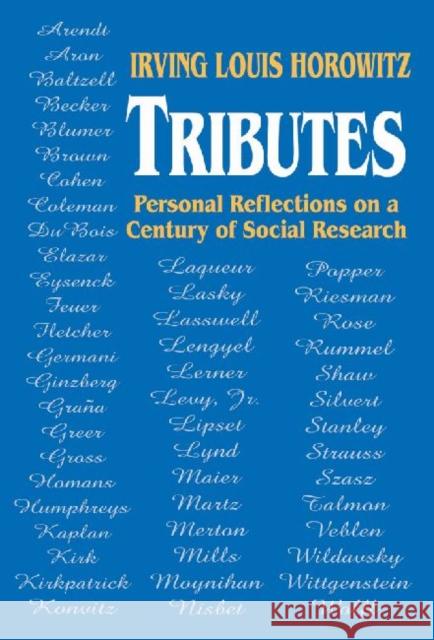Tributes: Personal Reflections on a Century of Social Research » książka
Tributes: Personal Reflections on a Century of Social Research
ISBN-13: 9780765802187 / Angielski / Twarda / 2003 / 370 str.
Tributes: Personal Reflections on a Century of Social Research
ISBN-13: 9780765802187 / Angielski / Twarda / 2003 / 370 str.
(netto: 419,76 VAT: 5%)
Najniższa cena z 30 dni: 428,13
ok. 22 dni roboczych.
Darmowa dostawa!
In one of his final works, Stephen Jay Gould spoke of the human race "as a wildly improbable evolutionary event well within the realm of contingency." Drawing on his personal knowledge of fifty figures from the world of twentieth-century social science, Irving Louis Horowitz offers commentaries drawn from a variety of public occasions to explain one segment of this improbable event. In the process he reveals how the past century was defined in substantial measure by the rise of social research.Commenting on Tributes, Daniel Mahoney observes, "some pieces are completely authoritative and detailed, others more conversational and informal. That diversity of approaches tied to the special character of these people increases the readability and interest in the book as a whole. In addition to illuminating the life and thought of these major figures, these essays and addresses reveal the impressive catholicity of Horowitz's concerns and his ability to remain open to the widest range of theoretical and practical approaches." In a certain sense, this book is also an intellectual autobiography in the form of an expression of Horowitz's debt to intellectual interlocutors and influences over the years. As a consequence, Tributes will be of the greatest interest to anyone who wishes to come to terms with the intellectual formation of the people who gave substance to new ways of experiencing as well as explaining society. The book is thus a thoughtful guide to the intellectual life of our times.From Arendt and Aron to Veblen and Wildavsky, these essays take shape as a systematic mosaic of the past century. Written by a central participant in social theory, Tributes is both an informal guide and a formal text for readers coming upon social science innovators for the first time. The book breaks the boundaries of conventional discourse and in so doing gives voice to the outstanding figures that helped make the twentieth century "the century of social research."











